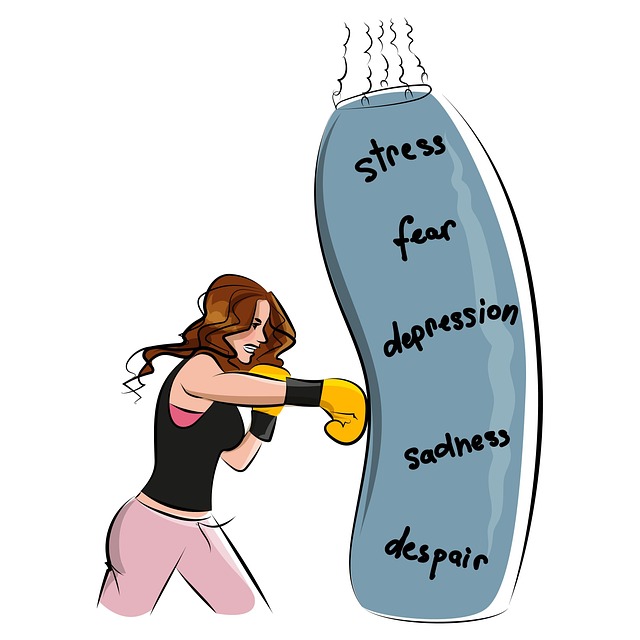Crisis Intervention Teams (CITs), as demonstrated by Broomfield Conduct Disorder Therapy, are vital for community safety and mental health support. Through specialized training, these teams use evidence-based techniques to de-escalate crises, foster empathy, and provide long-term care for individuals with conduct disorders. The program's holistic approach includes self-care practices, empathy-building strategies, and effective communication skills, empowering professionals to manage diverse crises successfully. This comprehensive training goes beyond theory, offering practical skills in de-escalation, case studies, and role-playing, contributing to resilient communities that can navigate mental health challenges more effectively.
“Crisis intervention team training programs are an essential pillar in fostering community safety and well-being. With a focus on rapid, effective response, these specialized teams play a vital role in managing high-risk situations. This article explores the critical need for comprehensive training, highlighting the impact of programs like Broomfield Conduct Disorder Therapy. We delve into key components that ensure professionals are equipped to handle crises, offering success stories and best practices that underscore the transformative power of well-designed crisis intervention training.”
- Understanding Crisis Intervention Teams: A Vital Resource for Community Safety
- The Importance of Training: Equipping Professionals for Effective Response
- Broomfield Conduct Disorder Therapy: A Specialized Approach within Crisis Interventions
- Key Components of Comprehensive Crisis Team Training Programs
- Real-World Impact: Success Stories and Best Practices in Crisis Intervention Training
Understanding Crisis Intervention Teams: A Vital Resource for Community Safety

Crisis Intervention Teams (CITs) are a vital resource in maintaining community safety and well-being. These specialized teams, often composed of law enforcement officers, mental health professionals, and social workers, are trained to respond to a range of critical incidents, from domestic disturbances to public crises. In Broomfield Conduct Disorder Therapy, for instance, CIT members play a crucial role in de-escalating situations that might otherwise escalate, using evidence-based conflict resolution techniques to bring peace to troubled minds.
The training programs for these teams go beyond mere crisis management. They equip participants with compassion cultivation practices and self-care routine development for better mental health, ensuring that they can provide not just immediate support but also long-term assistance. By fostering an environment of understanding and empathy, CITs help in breaking down barriers and promoting positive outcomes for individuals facing mental health challenges. This comprehensive approach reflects the evolving needs of communities today, where effective crisis intervention is as vital as ever.
The Importance of Training: Equipping Professionals for Effective Response

Training programs for crisis intervention teams are paramount in equipping professionals with the necessary skills and knowledge to respond effectively during times of intense emotional distress or behavioral crises. In Broomfield Conduct Disorder Therapy, for instance, specialized training ensures therapists are prepared to navigate complex situations with empathy and strategic interventions. This preparation fosters a supportive environment that encourages clients to openly discuss their challenges, enhancing the potential for positive outcomes in mental wellness.
Effective crisis intervention requires a blend of technical expertise and interpersonal skills. Through comprehensive training, professionals learn self-awareness exercises that enable them to manage their own emotions during high-stress scenarios. Moreover, these programs often incorporate community outreach program implementation strategies, equipping teams to collaborate with local resources for comprehensive client support. Such holistic training ensures crisis interventionists are not just equipped to handle crises but also to foster resilience and promote lasting recovery.
Broomfield Conduct Disorder Therapy: A Specialized Approach within Crisis Interventions

Broomfield Conduct Disorder Therapy offers a specialized approach to crisis interventions, focusing on individuals struggling with conduct disorders and the unique challenges they face. This therapeutic method goes beyond traditional crisis intervention techniques by incorporating strategies tailored to address underlying behavioral issues. The program aims to empower participants with effective coping mechanisms while fostering empathy building strategies among team members. By understanding the complexities of conduct disorders, crisis intervention teams can better manage high-risk situations and prevent burnout, a common challenge in this field.
Through interactive sessions and practical training, Broomfield Conduct Disorder Therapy equips professionals with the skills to navigate complex emotional landscapes. It emphasizes the importance of public awareness campaigns development to reduce stigma and improve support systems for those affected by these disorders. By integrating empathy-focused techniques into crisis intervention training, participants learn to de-escalate conflicts, build rapport with individuals in distress, and promote positive behavioral changes, ultimately enhancing their overall effectiveness in critical situations.
Key Components of Comprehensive Crisis Team Training Programs

Comprehensive crisis intervention team training programs are designed to equip professionals with the necessary skills to handle a wide range of crises effectively. Key components of such programs include robust Empathy Building Strategies, ensuring team members can connect and understand individuals in distress deeply. By fostering strong emotional connections, these strategies enhance the overall quality of care provided.
Additionally, integrating Self-Care Practices is vital for maintaining the well-being of crisis intervention teams. Training should emphasize the importance of self-care to prevent burnout and promote resilience among members. Effective communication strategies are another cornerstone, teaching team dynamics and conflict resolution techniques that facilitate clear and compassionate interactions during high-stress situations. These aspects collectively contribute to successful crisis management, reflecting the holistic nature of Broomfield Conduct Disorder Therapy.
Real-World Impact: Success Stories and Best Practices in Crisis Intervention Training

In the realm of crisis intervention, real-world impact is paramount. Successful training programs like Broomfield Conduct Disorder Therapy have emerged as game changers, transforming lives and communities. These initiatives go beyond textbook knowledge, emphasizing hands-on experience and practical application. Participants gain invaluable skills in communication strategies, enabling them to de-escalate tense situations effectively.
Through case studies and role-playing exercises, individuals learn to recognize subtle cues of distress and provide appropriate emotional regulation support. Best practices shared among these programs highlight the importance of mental wellness coaching, fostering a holistic approach that addresses both the individual’s immediate crisis and underlying mental health needs. Such training has been instrumental in building resilient communities where folks are equipped to navigate life’s challenges with greater ease.
Crisis intervention team training programs, such as Broomfield Conduct Disorder Therapy, play a pivotal role in equipping professionals with the skills needed for effective crisis response. By focusing on specialized approaches and comprehensive training that encompasses key components, these programs foster a culture of community safety and well-being. Real-world success stories highlight their impact, demonstrating the importance of continuous improvement and best practices in crisis intervention training.











